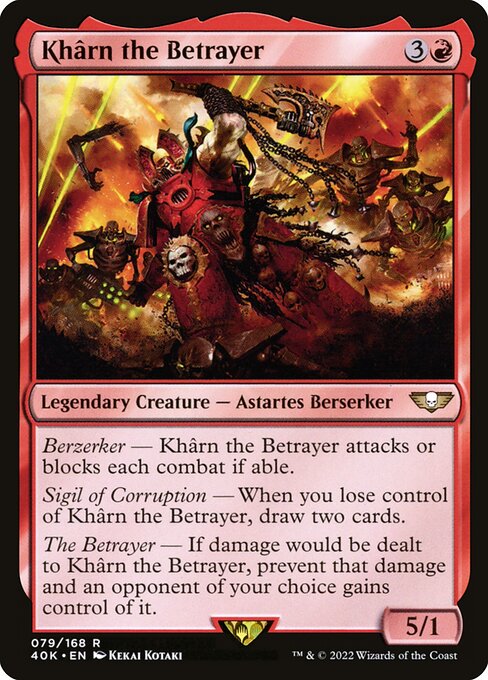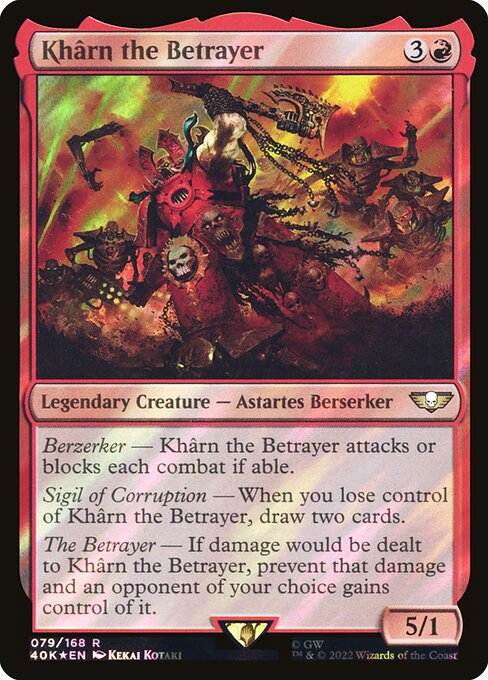standard
future
historic
gladiator
pioneer
explorer
modern
legacy
pauper
vintage
penny
commander
brawl
alchemy
paupercommander
duel
oldschool
premodern
Rulings
In some cases, a single spell or ability will deal damage to this creature multiple times during its resolution. In that case, a new player gains control of it each time, its ability triggers once each time, and the appropriate players control those triggers. After that spell or ability is done resolving, all of those triggers are put onto the stack in turn order, starting with the active player (or the next player in turn order if the active player isn’t involved). Usually, this means that the cards are drawn in a different order than the control-changing effects took place.
In contrast, the Sigil of Corruption ability is a triggered ability, and it won’t go onto the stack until after the spell or ability that tried to deal damage finishes resolving.
You lose control of Khârn the Betrayer when it leaves the battlefield or another player gains control of it.
An opponent gaining control of it is part of the replacement effect and happens immediately, even if you are in the middle of resolving the spell or ability and it has more instructions to perform after taking damage.
In contrast, the Sigil of Corruption ability is a triggered ability, and it won’t go onto the stack until after the spell or ability that tried to deal damage finishes resolving.
You lose control of Khârn the Betrayer when it leaves the battlefield or another player gains control of it.
An opponent gaining control of it is part of the replacement effect and happens immediately, even if you are in the middle of resolving the spell or ability and it has more instructions to perform after taking damage.
Rulings
In some cases, a single spell or ability will deal damage to this creature multiple times during its resolution. In that case, a new player gains control of it each time, its ability triggers once each time, and the appropriate players control those triggers. After that spell or ability is done resolving, all of those triggers are put onto the stack in turn order, starting with the active player (or the next player in turn order if the active player isn’t involved). Usually, this means that the cards are drawn in a different order than the control-changing effects took place.
In contrast, the Sigil of Corruption ability is a triggered ability, and it won’t go onto the stack until after the spell or ability that tried to deal damage finishes resolving.
You lose control of Khârn the Betrayer when it leaves the battlefield or another player gains control of it.
An opponent gaining control of it is part of the replacement effect and happens immediately, even if you are in the middle of resolving the spell or ability and it has more instructions to perform after taking damage.
In contrast, the Sigil of Corruption ability is a triggered ability, and it won’t go onto the stack until after the spell or ability that tried to deal damage finishes resolving.
You lose control of Khârn the Betrayer when it leaves the battlefield or another player gains control of it.
An opponent gaining control of it is part of the replacement effect and happens immediately, even if you are in the middle of resolving the spell or ability and it has more instructions to perform after taking damage.
Your collection? Your decks?
Want to manage your collection and/or create decks?


 0
0
 0.66€
0.66€
